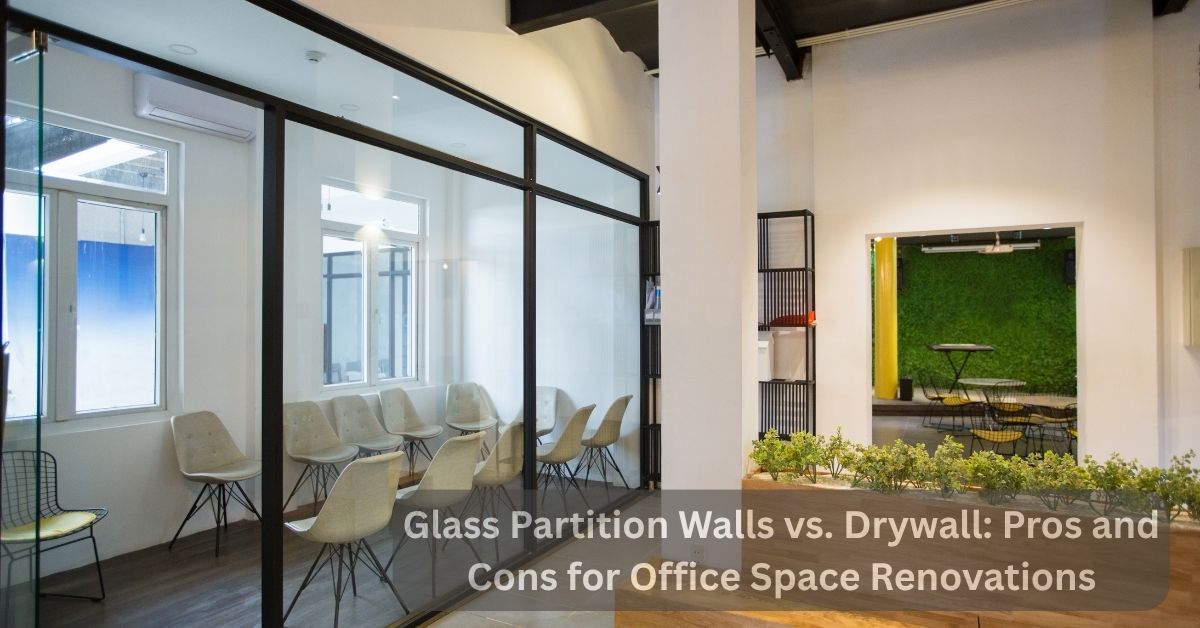Glass Partition Walls vs. Drywall: Pros and Cons for Office Space Renovations

In today’s fast-evolving commercial landscape, office design plays a crucial role in productivity, collaboration, and employee well-being. Two of the most commonly considered elements during office renovations are glass partition walls and drywall systems. Both have their merits and challenges, and the final choice depends on factors like functionality, aesthetics, cost, and sustainability.
This article dives deep into the pros and cons of each, especially within the context of modern workplaces in cities like Sydney, where Glass Office Partitions Sydney are becoming a popular choice for businesses aiming to create flexible, light-filled spaces. Alongside this trend, demand for reliable glass replacement solutions is also on the rise as companies seek smart upgrades for their interiors.
Understanding the Basics
What Are Glass Partition Walls?
Glass partition walls are non-load-bearing interior barriers made from toughened or laminated glass. They are typically used to divide office spaces while maintaining visibility and allowing natural light to flow freely. These partitions can be frameless, semi-framed, or fully framed, depending on design preference and budget.
What Is Drywall?
Drywall, also known as plasterboard or gypsum board, is a more traditional solution used for creating solid internal walls. It offers privacy and sound insulation and is commonly used in both commercial and residential properties.
Advantages of Glass Partition Walls
1. Enhanced Natural Light
One of the most celebrated advantages of glass partitions is the ability to maximise natural lighting. Offices that utilise these transparent barriers tend to feel more open, energetic, and welcoming.
In places like Sydney, where daylight can be leveraged throughout the year, glass office partitions can reduce the need for artificial lighting, leading to energy savings and improved employee morale.
2. Modern and Elegant Appearance
Glass adds a sleek, contemporary look that aligns with modern office aesthetics. It gives an impression of openness and professionalism while subtly branding the space as forward-thinking.
3. Improved Collaboration
Unlike traditional walls that block sightlines and sound completely, glass partitions promote visibility. This can foster a sense of teamwork and make managers more approachable, without compromising privacy when frosted or tinted glass is used.
4. Flexible Configuration
Glass walls can be installed as movable panels, allowing organisations to reconfigure office layouts as needs evolve. This makes them highly suitable for businesses undergoing frequent structural or staffing changes.
Disadvantages of Glass Partition Walls
1. Limited Sound Insulation
One of the drawbacks of glass is its limited acoustic insulation compared to drywall. While acoustic-grade glass is available, it usually comes at a premium cost.
2. Maintenance and Cleaning
Glass requires regular cleaning to maintain its clarity and shine. Fingerprints, smudges, and dust are more visible, especially in high-traffic areas. However, modern coating technologies have eased maintenance in recent years.
3. Cost Considerations
High-quality glass partitions, especially custom or curved installations, can be costlier upfront. However, over time, the energy savings and flexible layouts may offset the initial investment.
Advantages of Drywall
1. Strong Soundproofing
Drywall excels at absorbing and blocking sound, making it ideal for private offices, meeting rooms, or confidential workspaces.
2. Cost-Effective Installation
For businesses seeking a quick and budget-friendly solution, drywall is a practical option. It is also easy to install and repair, which can be an advantage during fast-paced renovation schedules.
3. Customisable Finishes
Drywalls can be painted, wallpapered, or textured to match the office branding or aesthetics. This offers flexibility in design choices and future updates.
4. Structural Concealment
Drywall allows for the easy concealment of wires, pipes, and HVAC systems, resulting in a cleaner interior appearance without visual interruptions.
Disadvantages of Drywall
1. Lack of Natural Light
Unlike glass, drywall creates opaque barriers, which limit natural light flow. This can lead to dim areas and a more closed-off feel in the workplace.
2. Permanent Layouts
Drywall structures are usually fixed and harder to move or reconfigure. Making changes in layout can involve demolition, extra labour, and downtime.
3. Dated Aesthetic
While practical, drywall lacks the modern appeal of glass. Offices relying heavily on drywall may appear outdated compared to their contemporary, glass-partitioned counterparts.
Glass Office Partitions in Sydney: A Growing Trend
In urban centres like Sydney, where commercial properties often prioritise aesthetics, energy efficiency, and agile workspace layouts, glass office partitions are becoming a preferred choice. These structures not only promote transparency but also align well with green building goals by optimising daylight and reducing energy consumption.
Whether for a startup co-working space or a high-end corporate suite, the demand for glass replacement Sydney is rising alongside renovations that prioritise sustainability and flexibility.
Long-Term Value and Sustainability
Another important consideration is sustainability. Glass partitions, particularly when combined with energy-efficient glazing, can contribute to greener workplaces. They help reduce dependency on artificial lighting and can be repurposed or relocated as office needs change—reducing construction waste.
Meanwhile, drywall, though recyclable, often leads to more waste during renovations. The material can also absorb moisture if not treated correctly, leading to long-term maintenance challenges.
The Role of Professional Installation
Regardless of the choice between glass and drywall, the installation process is crucial. Glass replacement services in Sydney have evolved to meet the growing demand for precise, safe, and high-quality glass partition installations. Professionals can also assist in choosing the right type of glass—be it frosted, acoustic, fire-rated, or UV-protective.
Conclusion
Choosing between glass partition walls and drywall ultimately depends on the specific needs of the workplace. While glass fosters collaboration, natural light, and modern design, drywall ensures privacy, affordability, and acoustic performance.
Both materials have their place in office design. However, with increasing emphasis on sustainability, employee experience, and visual openness—especially in dynamic business hubs like Sydney—glass office partitions are setting a new benchmark for commercial interiors. Whether considering a new office layout or a renovation project, it’s worth weighing the long-term benefits of glass against the functional strengths of traditional drywall.


